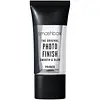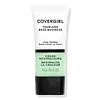Smashbox The Original Photo Finish Smooth & Blur Oil-Free Primer Versus Covergirl TruBlend Base Business Face Primer
What's inside
What's inside
 Key Ingredients
Key Ingredients

 Benefits
Benefits

 Concerns
Concerns

 Ingredients Side-by-side
Ingredients Side-by-side

Cyclopentasiloxane
EmollientDimethicone
EmollientDimethicone Crosspolymer
Emulsion StabilisingTrisiloxane
Skin ConditioningSilica
AbrasiveDimethicone/Vinyl Dimethicone Crosspolymer
Skin ConditioningEthylhexyl Salicylate
UV AbsorberRetinyl Palmitate
Skin ConditioningTocopheryl Acetate
AntioxidantCarthamus Tinctorius Seed Extract
Skin ConditioningPropylene Glycol
HumectantWater
Skin ConditioningVitis Vinifera Seed Extract
AntimicrobialCola Acuminata Seed Extract
Skin ConditioningCamellia Oleifera Leaf Extract
AstringentCyclopentasiloxane, Dimethicone, Dimethicone Crosspolymer, Trisiloxane, Silica, Dimethicone/Vinyl Dimethicone Crosspolymer, Ethylhexyl Salicylate, Retinyl Palmitate, Tocopheryl Acetate, Carthamus Tinctorius Seed Extract, Propylene Glycol, Water, Vitis Vinifera Seed Extract, Cola Acuminata Seed Extract, Camellia Oleifera Leaf Extract
Water
Skin ConditioningCyclopentasiloxane
EmollientPropylene Glycol
HumectantDimethicone
EmollientTalc
AbrasiveVinyl Dimethicone/Methicone Silsesquioxane Crosspolymer
Ethylhexyl Methoxycinnamate
UV AbsorberDimethicone Crosspolymer
Emulsion StabilisingDimethicone/PEG-10/15 Crosspolymer
Magnesium Sulfate
Lauryl PEG-9 Polydimethylsiloxyethyl Dimethicone
Skin ConditioningPhenoxyethanol
PreservativeParfum
MaskingCaprylyl Glycol
EmollientSilica
AbrasiveTocopheryl Acetate
AntioxidantLecithin
EmollientEthylhexyl Palmitate
EmollientGlycerin
HumectantRetinyl Palmitate
Skin ConditioningSorbic Acid
PreservativeHexyl Cinnamal
PerfumingLimonene
PerfumingDipropylene Glycol
HumectantButylphenyl Methylpropional
PerfumingAscorbyl Glucoside
AntioxidantBenzyl Salicylate
PerfumingLinalool
PerfumingPanthenol
Skin ConditioningGeraniol
PerfumingTocopherol
AntioxidantCitronellol
PerfumingAlpha-Isomethyl Ionone
PerfumingSilica Dimethyl Silylate
EmollientBHT
AntioxidantButylene Glycol
HumectantPunica Granatum Fruit Juice
MaskingSapphire Powder
Vitis Vinifera Juice
AntioxidantPalmaria Palmata Extract
Skin ProtectingSodium Hyaluronate
HumectantHexylene Glycol
EmulsifyingPantolactone
HumectantMica
Cosmetic ColorantCI 77891
Cosmetic ColorantCI 77288
Cosmetic ColorantIron Oxides
CI 77289
Cosmetic ColorantCI 77510
Cosmetic ColorantCI 75470
Cosmetic ColorantCI 77007
Cosmetic ColorantWater, Cyclopentasiloxane, Propylene Glycol, Dimethicone, Talc, Vinyl Dimethicone/Methicone Silsesquioxane Crosspolymer, Ethylhexyl Methoxycinnamate, Dimethicone Crosspolymer, Dimethicone/PEG-10/15 Crosspolymer, Magnesium Sulfate, Lauryl PEG-9 Polydimethylsiloxyethyl Dimethicone, Phenoxyethanol, Parfum, Caprylyl Glycol, Silica, Tocopheryl Acetate, Lecithin, Ethylhexyl Palmitate, Glycerin, Retinyl Palmitate, Sorbic Acid, Hexyl Cinnamal, Limonene, Dipropylene Glycol, Butylphenyl Methylpropional, Ascorbyl Glucoside, Benzyl Salicylate, Linalool, Panthenol, Geraniol, Tocopherol, Citronellol, Alpha-Isomethyl Ionone, Silica Dimethyl Silylate, BHT, Butylene Glycol, Punica Granatum Fruit Juice, Sapphire Powder, Vitis Vinifera Juice, Palmaria Palmata Extract, Sodium Hyaluronate, Hexylene Glycol, Pantolactone, Mica, CI 77891, CI 77288, Iron Oxides, CI 77289, CI 77510, CI 75470, CI 77007
 Reviews
Reviews

Ingredients Explained
These ingredients are found in both products.
Ingredients higher up in an ingredient list are typically present in a larger amount.
Cyclopentasiloxane, or D5, is a silicone used to improve texture of products and trap moisture.
D5 is considered lightweight and volatile. Volatile means it evaporates quickly after application. Once evaporated, D5 leaves a thin barrier that helps keep skin hydrated.
It is also an emollient. Emollients help soften the skin and prevent water loss. Silicones create a silky texture in products. D5 helps other ingredients become more spreadable.
Studies show D5 is safe to use in skincare products. We recommend speaking with a skincare professional if you have concerns.
Learn more about CyclopentasiloxaneDimethicone is a type of synthetic silicone created from natural materials such as quartz.
What it does:
Dimethicone comes in different viscosities:
Depending on the viscosity, dimethicone has different properties.
Ingredients lists don't always show which type is used, so we recommend reaching out to the brand if you have questions about the viscosity.
This ingredient is unlikely to cause irritation because it does not get absorbed into skin. However, people with silicone allergies should be careful about using this ingredient.
Note: Dimethicone may contribute to pilling. This is because it is not oil or water soluble, so pilling may occur when layered with products. When mixed with heavy oils in a formula, the outcome is also quite greasy.
Learn more about DimethiconeDimethicone Crosspolymer is a silicone created by modifying dimethicone with hydrocarbon side chains. Due to its large size, it does not penetrate skin. It is considered non-occlusive.
Dimethicone Crosspolymer is used to stabilize and thicken products. It also helps give products a silky feel.
Propylene Glycol is an odorless, colorless liquid. As a humectant, it helps skin retain moisture. It also aids in delivering active ingredients.
Another role of this ingredient is preventing a product from melting or freezing. Propylene glycol also adds antimicrobrial properties to a product, elongating product lifespan.
This ingredient is considered an organic alcohol and commonly added into both cosmetics and foods.
Those with sensitive skin or conditions may develop a rash when using this ingredient.
Learn more about Propylene GlycolRetinyl palmitate is a form of retinoid. Retinoids are the superstar class of anti-aging ingredients that include tretinoin and retinol.
This particular ingredient has had a bumpy year with its rise and fall in popularity.
First, Retinyl palmitate is created from palmitic acid and retinol. It is a retinol ester and considered one of the weaker forms of retinoid.
This is because all retinoids have to be converted to Tretinoin, AKA retinoic acid. Retinyl Palmitate is pretty far down the line and has to go through multiple conversions before its effects are seen.
Due to this long and ineffective conversion line, the benefits of Retinyl Palmitate are debated.
Studies show Retinyl Palmitate to help:
Dermatologists say this ingredient is ineffective because it isn't used in high enough concentrations in cosmetics.
This ingredient used to be found in sunscreens to boost the efficacy of sunscreen filters.
The downfall of Retinyl Palmitate was due to released reports about the ingredient being correlated to sun damage and skin tumors.
While there is a study showing this ingredient to cause DNA damage when exposed to UV-A, there is no concrete proof of it being linked to skin cancer. It is safe to use when used correctly.
All retinoids increase your skin's sensitivity to the sun in the first few months of usage. Be especially careful with reapplying sunscreen when using any form of retinoid.
Currently, this ingredient is still allowed in cosmetics all over the world. In Canada, cosmetics must have a warning label stating the product to contain Retinyl Palmitate
Fun fact: This ingredient is often added to low-fat milk to increase the levels of Vitamin A.
Learn more about Retinyl PalmitateSilica, also known as silicon dioxide, is a naturally occurring mineral. It is used as a fine, spherical, and porous powder in cosmetics.
Though it has exfoliant properties, the function of silica varies depending on the product.
The unique structure of silica enhances the spreadability and adds smoothness, making it a great texture enhancer.
It is also used as an active carrier, emulsifier, and mattifier due to its ability to absorb excess oil.
In some products, tiny microneedles called spicules are made from silica or hydrolyzed sponge. When you rub them in, they lightly polish away dead skin layers and enhance the penetration of active ingredients.
Learn more about SilicaTocopheryl Acetate is AKA Vitamin E. It is an antioxidant and protects your skin from free radicals. Free radicals damage the skin by breaking down collagen.
One study found using Tocopheryl Acetate with Vitamin C decreased the number of sunburned cells.
Tocopheryl Acetate is commonly found in both skincare and dietary supplements.
Learn more about Tocopheryl AcetateWater. It's the most common cosmetic ingredient of all. You'll usually see it at the top of ingredient lists, meaning that it makes up the largest part of the product.
So why is it so popular? Water most often acts as a solvent - this means that it helps dissolve other ingredients into the formulation.
You'll also recognize water as that liquid we all need to stay alive. If you see this, drink a glass of water. Stay hydrated!
Learn more about Water